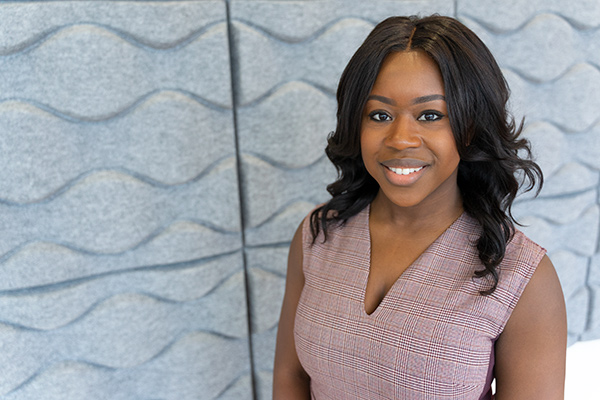Embracing Each Twist on a Meandering Pathway
Fanta Freeman, Class of 2019

A daughter of Sierra Leonean parents who spent part of her childhood in Ethiopia and Kenya before attending college in Boston and then becoming a teacher in North Carolina, Fanta Freeman is accustomed to winding pathways.
Freeman began law school with a clear plan for her journey: she would master the complexities of the U.S. legal system in order to make sense of injustices she’d witnessed in the community where her students lived.
She checked off every box on her itinerary: she gained experience working with clients through pro bono service at the Homeless Advocacy Project and drew insights about practicing law at a firm through a summer internship at Ballard Spahr. She found an attentive mentor through her co-op placement with Judge Marlene Lachman of the Philadelphia Court of Common Pleas. She honed her writing skills as an editor with Drexel Law Review.
But some experiences on the road threw her. She didn’t expect to enjoy courses like Contracts or Civil Procedure. And she was genuinely startled to discover that she loved her classes in Evidence with Professor Oates and Advanced Evidence with Professor Bernstein.
Freeman treasured being taken under Lachman’s wing during a co-op placement that allowed her to evaluate the strategies lawyers pursued as they litigated defamation and medical malpractice cases. But there, one of the biggest surprises was realizing how commonly lawyers err in their dealings with juries and that her own experience as a teacher would serve her well in the courtroom.
“Teaching seventh grade taught me a lot about keeping the attention of people when they’re hot, when they’re tired, when they don’t want to be there,” Freeman said. “Jurors are people. I think that’s really forgotten sometimes by some lawyers. It's really interesting to see how some decisions that lawyers make completely lose or gain a juror.”
Freeman’s interest in jurors and jury selection found its way into the note she wrote for the law review, “’Do I look Like I Have an Attitude?’: How Stereotypes of Black Women on Television Adversely Affect Black Female Defendants through the Implicit Bias of Jurors.”
Black women tend to be portrayed on reality TV programs as erratic and untrustworthy, Freeman’s research found, a phenomenon that disadvantages black female defendants.
“Jurors are exposed to those images,” she said, adding that the voir dire process should be adjusted to root out implicit bias.
That research and experiences inside and outside the classroom created a pathway that differed from what Freeman expected. Most surprising of all was finding herself accept a job offer from Ballard Spahr.
“My path didn’t have to look like I planned on it looking,” she said. “The road can look different. That took me a long time to accept.”